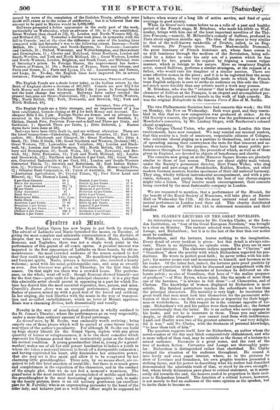MR. CLARKE'S LECTURES ON THE GREAT NOVF.TISTS.
An interesting course of lectures by Mr. Cowden Clarke, at the Lon- don Institution, on "four of the Great European Novelists," was brought to a close on Monday. The authors selected were Boccaccio, Cervantes, Lesage, and Richardson ; but it is to the last of the four that our notice must be confined.
Richardson, said the lecturer, leaves nothing to the imagination. Every detail of every incident is given : but this detail is always rele- vant. There is no digression, no episode even. The plots are at once simple and intricate. The elaborate indices appended to "Clarissa" and " Grandison" show the gravity with which Richardson regarded his pro- ductions. He wrote in perfect good faith ; he never trifles with his sub- ject; his matter seems real and momentous to himself, and becomes so to his reader. Of the latter fact, indeed, the lecturer gave proof positive by the earnest conviction with which he discussed and sympathized with the fortunes of Clarissa. Of the character of Lovelace he delivered an ela- borate precis ; as also of Grandison, that hero of " the malice prepense of goodness "—of Miss Byron, whose mind, like the minds of more than one of the heroines, " is always in full dress"—of Clementine, and of Clarissa. The knowledge of women displayed by Richardson is most subtile. His finished portraiture reaches the subordinate no less than the principal characters. His morality is very high : he inculcates the great truth that men must look into themselves for the paramount arbi- tration of their fate—on their own goodness or depravity for their happi- ness or wretchedness. In this respect he is the extreme opposite of Le- sage. Richardson's wit and his pathos were then touched on ; the former less convincingly than the latter. He is an author who never appears in his books, and yet he is incarnate in them. These you may admire deeply, or dislike altogether : you cannot read them with indifference. Lamb and Hazlitt were two of his greatest admirers ; a and very delight- ful it was," said Mr. Clarke, with the freshness of personal knowledge, " to hear them talk of him."
The question suggests itself, how far Richardson, an author whom the novel-readers of the day may think comparatively oldfashioned, and who is more talked of than read, may be suitable as the theme of a lecture to a mixed audience. Boccaccio is a great name, and the root of the tree of modern fiction : Cervantes and Lesage are thoroughly popu- lar : Richardson is distinguished rather than cherished. Mr. Clarke retained the attention of his audience throughout. He roused it into lively and even eager interest, where, as in the pictures he drew of Lovelace and Grandison, his own graphic touches presented a striking figure, and his power-in describing what his author had described demonstrated the admirable truth of that, or stood by its own strength: but, where lively delineation gave place to critical statement, as it neces- sarily did towards the end, the hearers cooled in proportion to their cool- ness to Richardson himself. The function of a critical lecture, however, is not merely to find an audience of the same opinion as the speaker, but to incite them to become so.


































 Previous page
Previous page